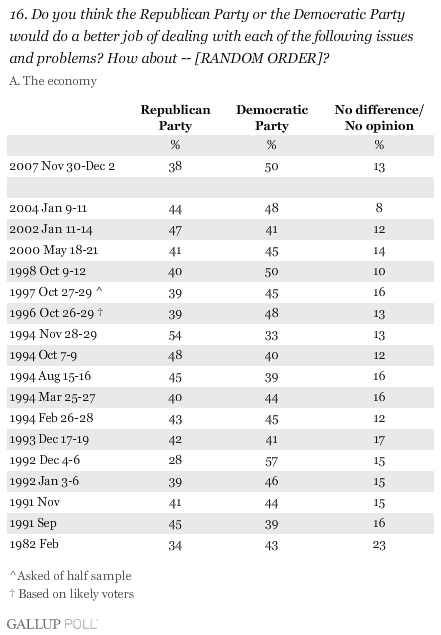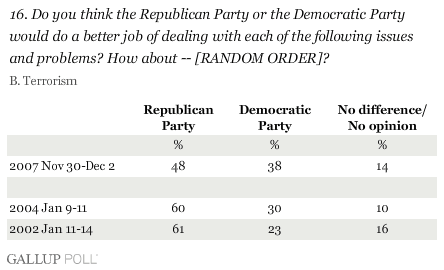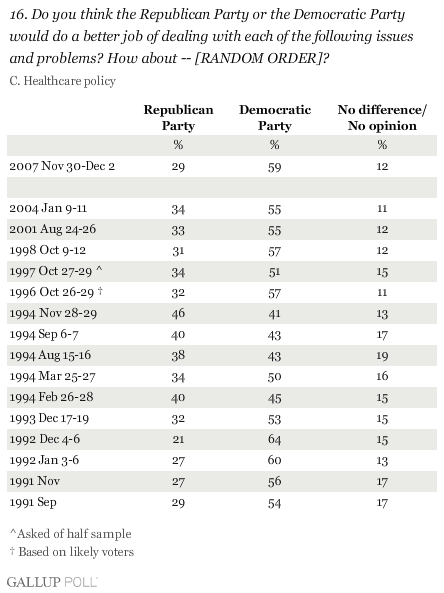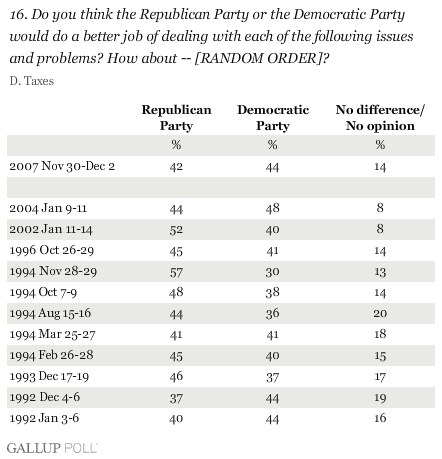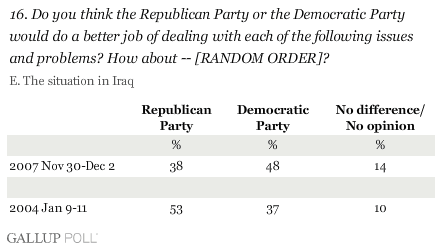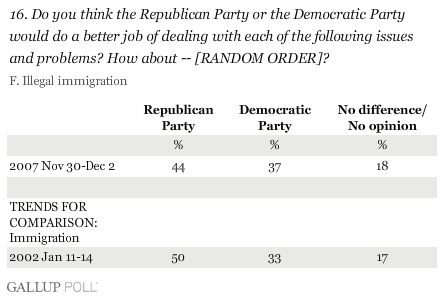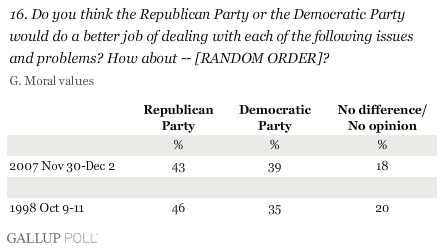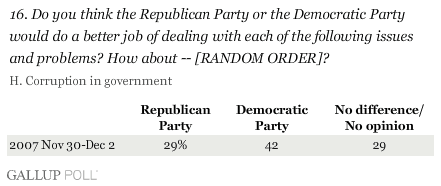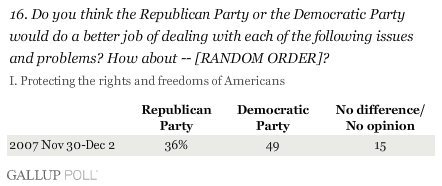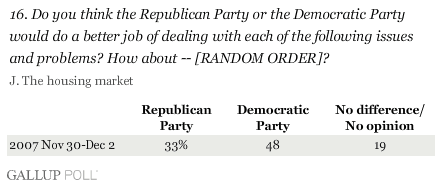PRINCETON, NJ -- Less than a year before Americans go to the polls to choose the next president and the 111th Congress, ÆéûÜǨû§finds the Democrats holding a considerable advantage over the Republicans in public perceptions of which party can handle a variety of national issues.
Overall, the Democratic Party is perceived as better able to handle 6 of 10 issues that are likely to be heavily debated in the 2008 campaigns, and they roughly tie with the Republican Party on another 2. The Republicans lead on illegal immigration and terrorism, but their previously substantial advantage on terrorism has been cut by two-thirds since 2004.
According to the new USA Today/ÆéûÜǨû§poll, conducted Nov. 30-Dec. 2, 2007, the Democrats' strongest issue areas include healthcare, the housing market, protecting Americans' rights and freedoms, corruption in government, the economy, and Iraq. The two parties are roughly tied on moral values and taxes. The Republican Party leads in public perceptions of which party can better handle terrorism and illegal immigration, but not by as much as the Democrats lead on their best signature issues.
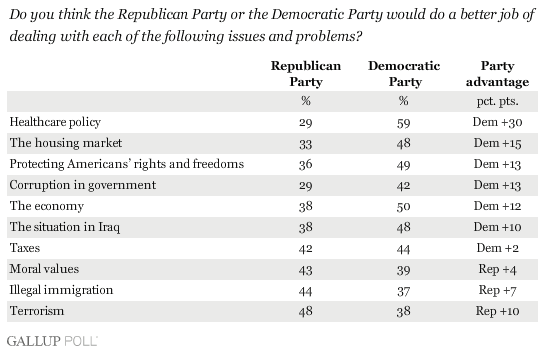
The Republican Party was in a much stronger position on issues in January 2004, 10 months before President George W. Bush won re-election and the Republicans retained their majority position in Congress.
At that time, the Republican Party held large leads on terrorism (+30 percentage points) and Iraq (+16), and closely matched the Democrats on the economy (-4) -- three of the most important issues to voters in that election. Republicans' advantage on terrorism has since fallen to only 10 points; they now lose to the Democrats on Iraq by 10 points, and on the economy by 12 points. At the same time, the Democrats' advantage on healthcare has expanded from 21 to 30 points.
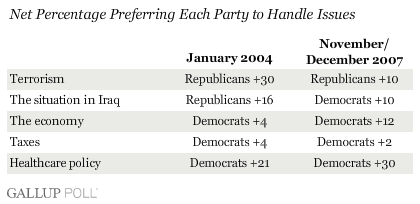
Democrats Above Par on the Economy
Gallup's long-term trend for which party can better handle the economy finds the Democrats doing well on a historical basis. ÆéûÜǨû§has been taking this measure periodically since 1982, and in most of those cases the Democrats have led the Republicans in perceptions of which party can better handle the economy -- however, not often by as large a margin as they do today.
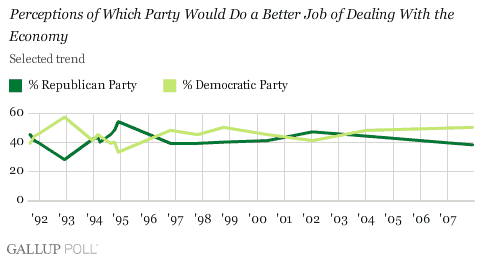
Across all 18 party ratings on the economy, the Democrats have averaged a 2-point lead, 44% vs. 42%. Furthermore, the Democrats consistently tied or led the Republicans on the economy within the year before each of the last four presidential elections, two of which Democrat Bill Clinton won (1992 and 1996), and two of which Republican George W. Bush won (2000 and 2004).
- In January 1992, the Democrats led the Republicans by seven points as the party better able to handle the economy.
- In October 1996, the Democrats led by nine points.
- In May 2000, the Democrats led by four points (within the margin of error).
- In January 2004, the Democrats again led by four points (also within the margin of error).
In short, while it is not unusual for the Republicans to be at parity with or behind the Democrats on this measure, their current 12-point deficit is on the high side. If a disadvantage this large persists in 2008, it could spell trouble for the party if the economy figures as a major issue for voters.
Democrats' Lead on Healthcare Not Unusual
From a historical perspective, the Democrats' current advantage over the Republicans on healthcare policy is less striking. Except for a period in 1994, the Democrats have typically led by a wide margin on healthcare. Their current 30-point advantage is similar to their 33-point lead in January 1992, and not much higher than the 21- to 26-point leads seen in recent years.
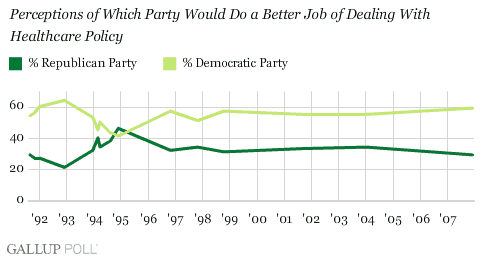
Parity on Taxes Is Not Notable, Either
The lead in perceived handling of taxes has shifted back and forth between the Democrats and Republicans over the years. Thus, the fact that the parties are roughly at parity today is not particularly notable. The Republican Party enjoyed 5- to 10-point leads on this measure leading up to November 1994, when Republicans won a historic takeover of Congress. This was followed by a sharp spike in preference for the Republicans on taxes in a late November 1994 poll. However, at most other times, the two parties have been closely matched, as they are today.
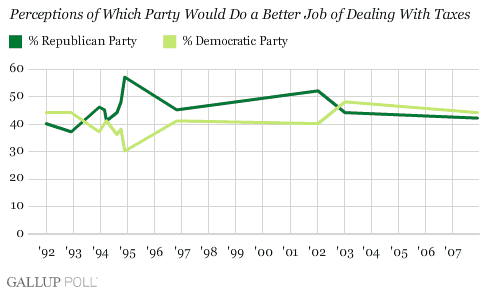
Bottom Line
In January 2004, 10 months prior to that year's presidential election that Bush won, the Republican Party dominated public preferences for which party could better handle terrorism and Iraq, was at parity with the Democrats on the economy and taxes, and was well behind the Democrats on healthcare.
Today, some 11 months before the 2008 presidential election, the Republicans hold at best modest leads over the Democrats on immigration and terrorism; they tie the Democrats on taxes; trail by 10 or more points on the housing market, the economy, and Iraq; and are substantially behind on healthcare.
Lacking their previous dominance on terrorism and Iraq, and failing to beat the Democrats on every economic or pocketbook issue tested, the Republicans have a lot of ground to make up on issues. It seems unlikely that their seven-point lead on illegal immigration -- the only issue besides terrorism for which the Republicans are preferred -- positions them to do that.
Survey Methods
Results are based on telephone interviews with 1,006 national adults, aged 18 and older, conducted Nov. 30-Dec. 2, 2007. For results based on the total sample of national adults, one can say with 95% confidence that the maximum margin of sampling error is ôÝ3 percentage points.
In addition to sampling error, question wording and practical difficulties in conducting surveys can introduce error or bias into the findings of public opinion polls.
